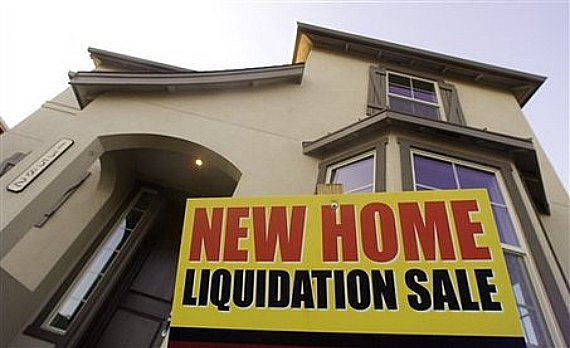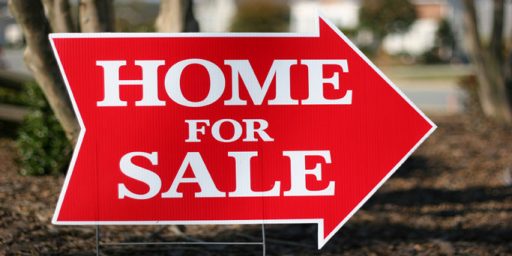New Home Sales Hit Record Low After Tax Credit Expires
The real estate market is returning to normal after being artificially stimulated by a tax credit.
Another sign that the expiration of the homebuyer tax credit is causing the housing market to return to normal:
Sales of new homes dropped to a record low in May, showing just how much the market has been dependent on a federal stimulus program, according to new government figures released Wednesday.
The Commerce Department figures showed that new single-family homes sold last month at a seasonally adjusted annual rate of 300,000, down 32.7 percent from the revised April rate of 446,000.
Analysts had expected sales to fall to about 400,000 in May after a government tax credit for new buyers expired at the end of April. Many said the actual figure was exceedingly low.
“That new home sales would decline in May following the expiration of the home buyers credit is not at all surprising,” said Dan Greenhaus, chief economic strategist for Miller Tabak, in a research note. “However, we would be lying if we said the size of the drop was not shocking.”
Mr. Greenhaus said the 32.7 percent drop was the largest since the government started compiling the data in 1963, surpassing the 23.8 percent decline in January 1994. The May sales rate is 18.3 percent below that of May 2009, when the figure was 367,000.
Home sales can offer insight into the state of the economic recovery because of their implications for consumer spending and the way they reflect the health of the job market. The news followed a weak report on Tuesday about existing home sales, which also fell in May compared with April.
Those existing home sales numbers weren’t any more encouraging:
There were 5.66 million sales of existing homes last month, down from a revised 5.79 million in April, the association said. While the seasonally adjusted figure for May was weaker than the 6.12 million analysts had expected, it represented a 19 percent increase from the same month last year.
The association’s chief economist, Lawrence Yun, said the year-over-year increase was driven by a federal tax credit that applied only to home buyers who close before the end of June, making it unlikely that the performance would be sustained.
“We are witnessing the ongoing effects of the home buyer tax credit, which we will also see in June real estate closings,” Mr. Yun said. “However, approximately 180,000 home buyers who signed a contract in good faith to receive the tax credit may not be able to finalize by the end of June due to delays in the mortgage process, particularly for short sales.”
None of this should be surprising. As with the news last week that new home construction had plummeted in May, it is a sign that the demand created by the $ 8,000 tax credit was entirely artificial, just as the demand created for new cars by last year’s “Cash For Clunkers” program was entirely artificial.
More importantly, though, we’re now starting to hear stories of corruption associated with the homebuyer tax credits, including today’s revelation that some of the money actually went to prison inmates:
Nearly 1,300 prison inmates wrongly received more than $9 million in tax credits for homebuyers despite being locked up when they claimed they bought a home, a government investigator reported Wednesday.
The investigator said 241 of the inmates were serving life sentences.
In all, more than 14,100 taxpayers wrongly received at least $26.7 million in tax credits that were meant to boost the nation’s slumping housing markets, said the report by J. Russell George, the Treasury Department’s inspector general for tax administration.
Some taxpayers received the credit for homes purchased before the tax break was started. In other cases, multiple taxpayers improperly used the same home to claim multiple credits. Investigators found one home that was used by 67 taxpayers to claim credits.
“This is very troubling,” George said. “Congress created and modified the homebuyer credit to stimulate the economy and help taxpayers achieve the American dream, not to line the pockets of wrongdoers.”
It didn’t stimulate the economy, of course, but I really don’t understand why Mr. George is so shocked to find corruption associated with a government program that basically involves giving away free money.







I (and many here) disliked the credits, and expected them only to slow the decline. That said, I’m not sure that it can be said out of hand that this “handbrake” on the crash was without merit.
How much greater would unemployment be now if we’d had greater panic then?
So, ah, the IRS can’t run the SSNs on tax returns through a prison population database? And how do they know these are wrongdoers? If the purpose was to funnel money to loyal Democrat voters, then you’d expect a few dead and incarcerated to show up on the lists.
Change? Democrat corruption – small, petty and thuggish. Republican corruption – refined, bold and the wrongdoers wear villainous hats and trench coats.
JP invokes the usual “yes, it was basically ineffective and transitory policy, but just think how bad it might have been otherwise!”
But now, as must always occur, we are headed toward finding equilibrium, yet saddled with the costs of the policy.
Same as it ever was.
The real issue is yet to come. Will the Obama Administration, for pure self interested political gain, recommend a second round of policy that just fell flat on its face.
And you guys wonder why I want to shrink government.
Well I am saying I wouldn’t have done it (the home or auto buyers credits), but my nuance is that claims that “it didn’t do anything” are not really sensible either.
It did something. It stalled the decline, as you say at a cost of $___ (insert total here).
The total is not as far as I know trillions for those specific programs.
s/stalled/slowed/
s/stalled/slowed/special effected
JP –
I know it didn’t do nothing. By definition if the government pays a guy to dig a hole, fill it, dig a hole, fill it……….it does something. It pays a guy to fill a hole. But such a view does not consider alternative, and perhaps better, uses of resources, or the down the road costs of paying a guy to dig a hole.
I was really responding to this, in the original text: “It didn’t stimulate the economy, of course”